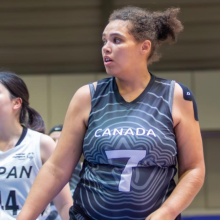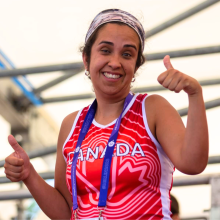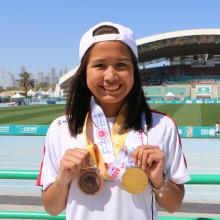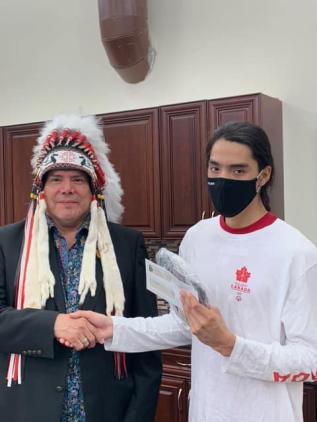National Day for Truth and Reconciliation 2024
September 30th marks Canada’s National Day for Truth and Reconciliation.
On this day, we recognize the painful history and impacts of the residential school system, particularly in light of the discoveries of unmarked grave sites at former residential school locations this year. It’s a time to forward our reconciliation efforts to build a better future for all Canadians.
Reconciliation is the process of healing relationships between Indigenous and non-Indigenous Canadians, which requires public truth sharing and commemoration that acknowledges and amends past and present harms.
We all have a role to play in the ongoing commitment to Truth and Reconciliation. Special Olympics Canada encourages all athletes, coaches, volunteers, staff and supporters in our community to honour the National Day for Truth and Reconciliation, whether through personal reflection or education and awareness activities.
Orange Shirt Day
Both the National Day for Truth and Reconciliation and Orange Shirt Day take place on September 30.
Orange Shirt Day is an Indigenous-led grassroots commemorative day intended to raise awareness of the individual, family and community inter-generational impacts of residential schools, and to promote the concept of “Every Child Matters”. The orange shirt is a symbol of the stripping away of culture, freedom and self-esteem experienced by Indigenous children over generations. This day relates to the experience of Phyllis Webstad, a Northern Secwpemc (Shuswap) from the Stswecem'c Xgat'tem First Nation, on her first day of school, where she arrived dressed in a new orange shirt, which was taken from her.
On September 30, we encourage all Canadians to wear orange to raise awareness of the tragic legacy of residential schools, and to honour the thousands of Survivors.
Celebrating Special Olympics Athletes with Indigenous Heritage
This National Day for Truth and Reconciliation – and all year long – we celebrate the inspiring achievements of Special Olympics athletes across Canada with Indigenous heritage.
Owen Munroe, Special Olympics Yukon
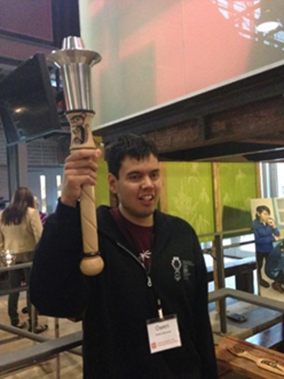 Special Olympics Yukon cross-country skier Owen Munroe is a proud member of the Kaska First Nation and has been a Special Olympics athlete for an impressive 20 years.
Special Olympics Yukon cross-country skier Owen Munroe is a proud member of the Kaska First Nation and has been a Special Olympics athlete for an impressive 20 years.
In 2014, Owen had the honour of carving the Torch used for the Yukon Law Enforcement Torch Run, a symbolic gesture that proudly showcased his Indigenous heritage. This Torch continues to hold significance within Special Olympics Yukon, serving as a lasting tribute to Owen's enduring spirit and cultural pride.
Owen’s dedication to his sport has taken him to the national stage nine times. Owen recently participated in the Special Olympics Canada Winter Games Calgary, where he dedicated himself to intense endurance training for competition in cross-country skiing. He candidly shared that he was focused on improving his conditioning after he struggled with the hills at an earlier qualifying competition in Yukon.
“Those hills were like 140m – that’s a really high climb. I struggled with them so I was a little worried about the hills in Calgary. But now that I’m here in Calgary, these hills are only about 10m, so I think us Yukoners are well prepared,” he shared ahead of competition.
Owen’s dedication to his training paid off as he took home three medals during the Games.
Meet Tyra Flukinger
Special Olympics athlete Tyra Flukinger is a Métis First Nations member and was proud to be part of Canada’s first all-female basketball team competing Special Olympics World Games Berlin 2023. Together with her teammates, they brought home a gold medal for Canada.
“It’s pretty cool to be part of the first women’s basketball team going to World Games. I think that’s pretty honourable. Being a First Nations Métis Black woman, I think it’s cool to be part of a diverse women’s team!” she shares.
Watch Tyra's Highlight Reel:
Meet JOLYN WATTS
Special Olympics athlete Jolyn Watts is a Tseshaht First Nation member and took home a gold medal in athletics from the Special Olympics World Games Berlin 2023.
"Special Olympics has allowed me to become more social, make new friends, travel, and try new activities. I am very proud of being part of a team, and winning medals when I do my very best!" shares Jolyn.
Meet Arianna Phillips
Arianna is Snuneymuxw and Teeshaht and is a member of Snuneymuxw First Nations. She is also a multi-sport athlete known for her passionate pursuit of personal bests.
It all started with Tee-Ball and figure skating at 4-years-old. Now 18, Arianna has traveled the globe and has brought home gold, silver and bronze medals from competition at the provincial, national and world stage.
"Special Olympics gives athletes like me a chance to do our best, at our own personal level. When I beat my personal best, I collapsed to the ground with tears because I was so happy," Arianna shares.
Watch Arianna's Highlight Reel
Meet William Hart
William is originally from The Nisichawayasihk Cree Nation but lives in Thompson, Manitoba. He and his
twin sister Jemiha have both been Special Olympics since they were 7 years old. He started off with swimming, then went to figure skating, and most recently qualified for Special Olympics Team Canada 2022 for alpine skiing.
At the Special Olympics Team Canada 2022 Training Camp Weekend, William delivered a land acknowledgment and shared a message with his team members:
“I would like to share a special moment from the last 2 years. I realize many people – even people you don’t know – are supportive of Indigenous athletes. People want to see me achieve my dreams. While I was preparing for World Games, Manitoba Keewatinowi Okimakanak Grand Chief Garrison Settee invited me to the Imperial Office and addressed me as a great Warrior. He stated ‘We believe in your dream, we believe in your vision, and we believe in your goal… you are truly a warrior and I am very proud of you.’ He wore a traditional headdress and presented me with a gift. I felt very special and proud to have my own First Nations people so supportive of me as I worked toward achieving my dreams as a member of Special Olympics Team Canada 2022. During the last two years, we have had many challenges. Each obstacle we have encountered made us better and stronger – no matter our race, culture, religion or who we are.”
Special Olympics Canada’s Commitment to Indigenous Inclusion and Partnership
At Special Olympics Canada, we recognize the importance of building meaningful and enduring relationships with Indigenous communities across the country. Our mission is to create an inclusive environment where everyone has the opportunity to participate in and benefit from the transformative power of sport. We have already taken steps to promote Indigenous inclusion within our organization and are dedicated to building on this foundation.
We are currently in the beginning phases of this important work. As an organization, we acknowledge that we have much to learn. This journey requires listening, understanding and adapting. We are dedicated to this ongoing process and are committed to making long-term investments to support it.
We are committed to investing time, learning and expertise in the following key areas:
•Building Long-Lasting Relationships with Indigenous Partners: We aim to establish and nurture partnerships with Indigenous communities, organizations and leaders to ensure that our programs are accessible and relevant to Indigenous athletes, coaches and families. These relationships will be built on mutual respect, trust and a shared vision of inclusivity.
• Implementing Organizational Training, Education, and Awareness: We understand that to serve Indigenous communities effectively, we must first educate ourselves. We are dedicated to implementing comprehensive training programs for staff, coaches and volunteers that will enhance our understanding of Indigenous cultures, histories and perspectives. This training will influence our approach to programs, prioritizing cultural sensitivity and respect.
• Incorporating a Cultural Lens into Resources: We are in the process of reviewing and updating our existing resources, while developing new ones with a cultural lens that reflects the diverse Indigenous communities we aim to serve.
We know that true inclusion is a continuous journey, and we are prepared to walk this path with our Indigenous partners, guided by their knowledge and experiences.
Together, we will work towards creating a more inclusive Canada for all.
More Information and Resources:
Start your learning journey here by exploring more about the rich and diverse cultures, voices, experiences and histories of First Nations, Inuit and Métis Peoples.
INDIGENOUS PEOPLES AND CULTURES
Learn about the unique history, languages, cultural practices, and spiritual beliefs of Indigenous peoples in Canada.
Indigenous history in Canada
Learn more about the contributions of Indigenous peoples from the Royal Proclamation of 1763 through the world wars to today.
TRUTH AND RECONCILIATION COMMISSION OF CANADA
SPORT AND RECONCILIATION
Learn how the Government of Canada is responding to the Truth and Reconciliation Commission's Calls to Action 87 to 91.

